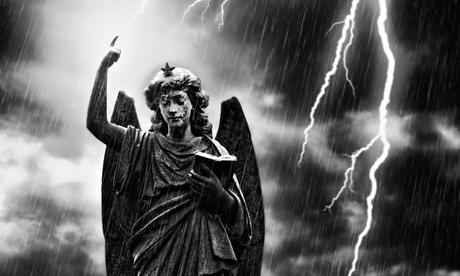
Hate is as fine a motivator of the muse as love, and who better to provide an angry Poem of the week than the Dean of St Patrick's Cathedral, Dublin – the Reverend Dr Jonathan Swift? A Satirical Elegy on the Death of a Late Famous General is indeed a poem so angry it sometimes forgets to be satirical: the moral castigation is paramount, and one admires the poet all the more for getting away with the naked simplicity of it.
The target is John Churchill, the first Duke of Marlborough. Swift had previously written of him in The Journal to Stella: "I confess my belief that he has not one good quality in the world beside that of a general, and even that I have heard denied by several great soldiers." The poem echoes the soldiers' view, perhaps, in its professed amazement that the "mighty warrior" should have died at home in bed. Marlborough's chief crime was not cowardice, however, but devotion to "his profit and his pride". Swift, a staunch Tory, considered the Whig general to be a war-profiteer, who had prolonged the war of the Spanish succession deliberately to enrich himself and his party.
Some commentators believe the poem's first stanza to be a dialogue: speaker one takes lines one to four, speaker two, lines five to eight, and so on. But the voices are barely differentiated, and I prefer the idea expressed here of a single speaker, a man who has bumped into a friend on a London street. The friend has told him the news of the Duke's death before the poem begins and the speaker, a knowingly unreliable narrator, rattles on with his commentary, even as the funeral procession comes into view.
Swift's satire is not literary or sophisticated but a punchy colloquial sarcasm strongly vocalised. The faux naïf confusion over the Duke's age unveils the worst that could be wished about the dead: the Duke, who died at the age of 72, should have gone earlier, at 60. "And could he be indeed so old / As by the newspapers we're told? / Threescore, I think, is pretty high; /' Twas time in conscience he should die!"
The poem is grounded in Christian theology at its most punitive. Marlborough has wilfully created widows and orphans (that's why none follow his procession) and when "the last trump" sounds, he will be summoned to eternal damnation. The final verse is sometimes described as an epitaph, but really it's an invocation. Swift's repeated "Come hither" personally invites the damned into hell. These are the falsely elevated, the men made great by puffery, mere bubbles that are ultimately dirt. "Dirt" completes the metaphor of the "stink" which the Duke's snuffed candle has left behind. The last four lines "say it all", declaring the elegy's moral with all the fierce scorn and denunciation the iambic tetrameter can liberate: "Let pride be taught by this rebuke, / How very mean a thing's a duke; / From all his ill-got honours flung, / Turn'd to that dirt from whence he sprung"
A Satirical Elegy on the Death of a Late Famous General
His Grace! impossible! what, dead!
Of old age too, and in his bed!
And could that mighty warrior fall,
And so inglorious, after all?
Well, since he's gone, no matter how,
The last loud trump must wake him now;
And, trust me, as the noise grows stronger,
He'd wish to sleep a little longer.
And could he be indeed so old
As by the newspapers we're told?
Threescore, I think, is pretty high;
'Twas time in conscience he should die!
This world he cumber'd long enough;
He burnt his candle to the snuff;
And that's the reason, some folks think,
He left behind so great a s----k.
Behold his funeral appears.
Nor widow's sighs, nor orphan's tears,
Wont at such times each heart to pierce,
Attend the progress of his hearse.
But what of that? his friends may say,
He had those honours in his day.
True to his profit and his pride,
He made them weep before he died
Come hither, all ye empty things,
Ye bubbles rais'd by breath of kings;
Who float upon the tide of state;
Come hither, and behold your fate.
Let pride be taught by this rebuke,
How very mean a thing's a duke;
From all his ill-got honours flung,
Turn'd to that dirt from whence he sprung.

